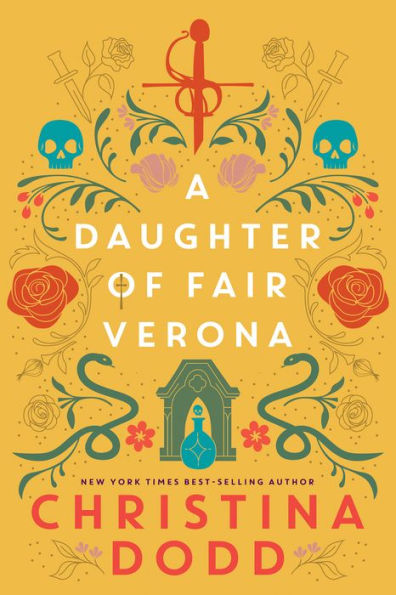
BUY NOW
Hardcover
Barnes & Noble
Bookshop
Books-A-Million
Trade Paperback
Barnes & Noble
Bookshop
Books-A-Million
eBook
Barnes & Noble
Kobo
Google Play
Apple Books
Indigo
Audio
Audible
Amazon Audible
Chirp
Libro
Barnes & Noble
Kobo
More Buying Options
Katy
Powell's
Indigo
Goodreads
Poisoned Pen
A Daughter of Fair Verona
A DAUGHTER OF FAIR VERONA Readers’ Guide Questions
(As with all Readers’ Guide Questions, it is strongly suggested you not read these until you’ve read the story.)
Warning! Contains spoilers about A DAUGHTER OF FAIR VERONA .
1. The premise of A DAUGHTER OF FAIR VERONA is that Romeo and Juliet did not die in the tomb but instead enjoyed a normal, happy life with their many children. Do you like this outcome? Do you feel that it’s more likely their impetuous union would lead to an unhappy marriage? What results of such young love have you seen in your life?
2. Have you ever felt the all-consuming teenage passion of Romeo and Juliet? Can you imagine marrying the person you feel in love with at thirteen years of age? In your opinion, how would that union have turned out in today’s society?
3. Rosie’s life has been so saturated with the Romeo and Juliet romantic legend that, at the beginning of the story, she’s stubbornly opposed to falling in love. Do you consider that an expected reaction? How would you react to being a child of such famed and venerated lovers?
4. For the most part, Rosie speaks to the reader in a contemporary voice and in fact is lamentably bad at the poetry that epitomizes Shakespeare’s tragic romance, Romeo and Juliet. In your opinion, does her flippant sarcasm add or detract from the story told in A DAUGHTER OF FAIR VERONA? Do you feel you related to Rosie more because of the lack of Shakespeare’s Elizabethan language?
5. The stories of Romeo and Juliet and of Rosie Montague are set in a time where marriages were arranged and brokered by a woman’s parents. Imagine you were living in such a culture: What would your reaction be to a marriage brokered by your parents? Would it be akin to Rosie’s attempts to escape matrimony, or would you accept the match? Discuss the factors that would lead to your decision.
6. On page 1, Rosie sarcastically says, “Nothing bad ever came of love at first sight, right?” Yet despite her opposition to falling in love, at her betrothal ball, Rosie runs into Lysander and, like her parents, is instantly smitten. Do you believe in love at first sight? What do you think are the chances of union based on passion and visual attraction surviving?
7. Have you known a gossipmonger like Porcia? How would you/did you handle her constant barrage of insults and accusations?
8. Prince Escalus is intent on proving Rosie innocent of the murder at her betrothal ball. As you read that scene, did you believe the remote prince was motivated by his quest for justice and his desire to keep Verona’s peace? Now that you’ve finished the book and know more about his character, what do you see as his true motivations?
9. The author considered many titles for this first work in the Daughter of Montague series before settling on A DAUGHTER OF FAIR VERONA. What alternate titles would you give this story?
10. In a film adaptation of this story, who would you cast as the pragmatic Rosie? The intelligent and romantic Lysander? The enigmatic Prince Escalus? The wicked Duke Stephano? And, of course, the now-in-their-thirties Romeo and Juliet?
11. In order to research the setting of this story, the author visited Verona, Italy, one of the less visited, yet most beautiful cities in Europe. After reading this story, would you visit fair Verona? Knowing that Romeo and Juliet is a work of fiction, would you visit the tourist sites (notably Juliet’s house with her statue and the iconic balcony) dedicated to the doomed lovers?
12. How would you describe the story to convince a potential reader to read A DAUGHTER OF FAIR VERONA? Would you call it a historical work of fiction based on a Shakespearean work of fiction? A murder mystery? A coming of age story? A humorous take on a legendary tale? What scenes would you cite as memorable?
13. A DAUGHTER OF FAIR VERONA’s cover is striking with its bold colors and symbolic use of daggers, skulls, asps, roses, and a cross cleverly placed into the title. Do you think it aptly conveys an impression of the story told within? If you were tapped to design a cover based on such an iconic story, what elements would you include?
14. Most historians agree that William Shakespeare never left the British Isles, yet he chose Verona as the setting for three of his plays: Romeo and Juliet, Two Gentlemen of Verona and, in part, The Taming of the Shrew. He wrote of faraway places, places that to him would have been as exotic as any fantasy world created today. Given his love for setting his stories in Italy, do you think he traveled there in his lifetime? What known attributes about Italy do you think motivated his use of the setting?
15. Overall, what is your take on the liberties the author took with the most famous and cherished Shakespearean play, Romeo and Juliet? How would you tweak the most known love story of all time?







